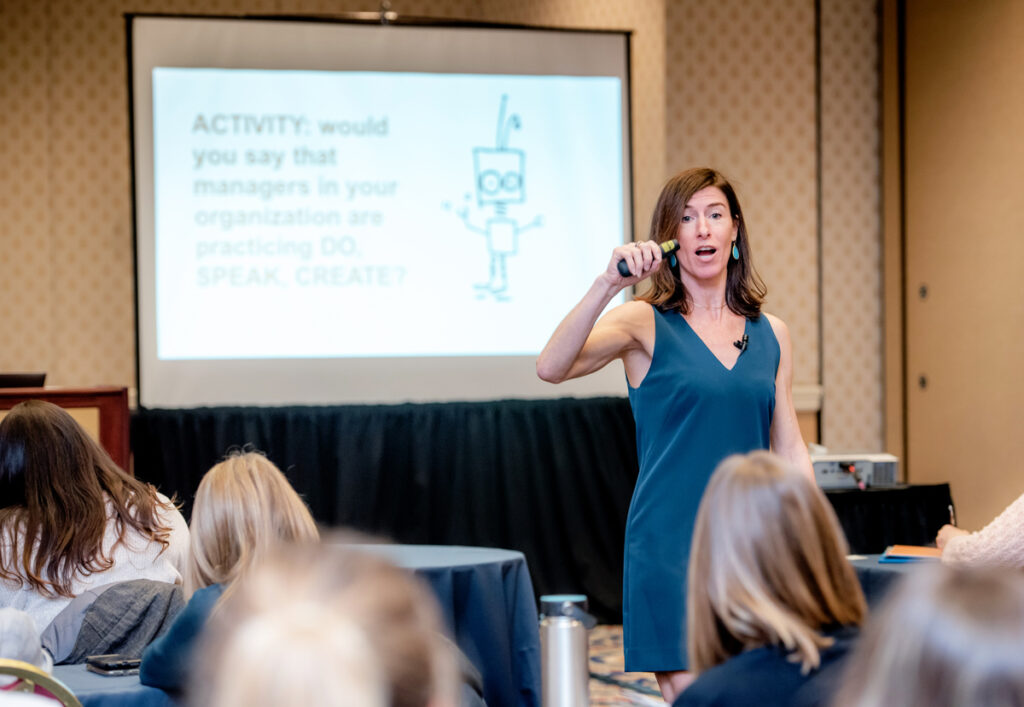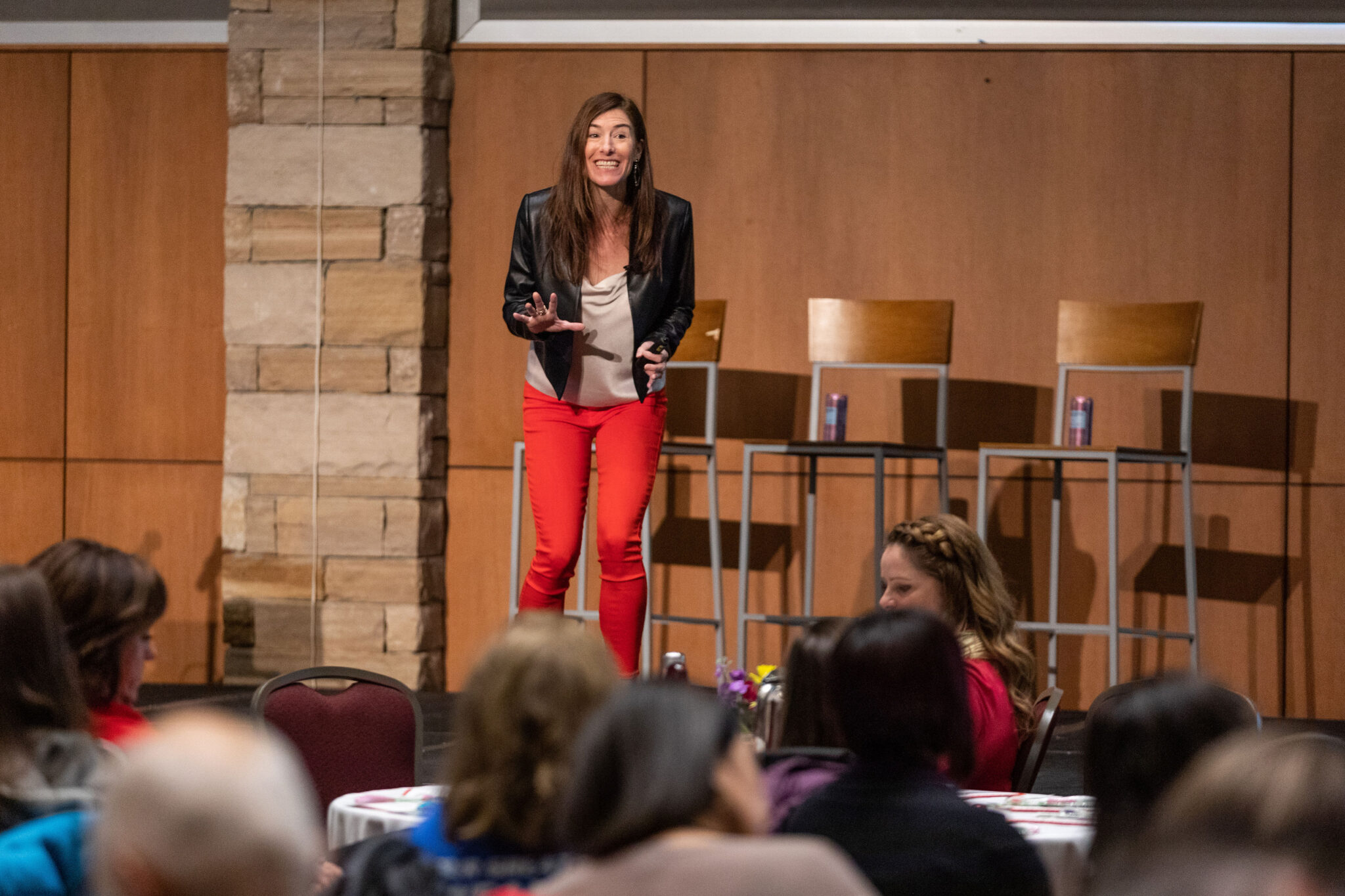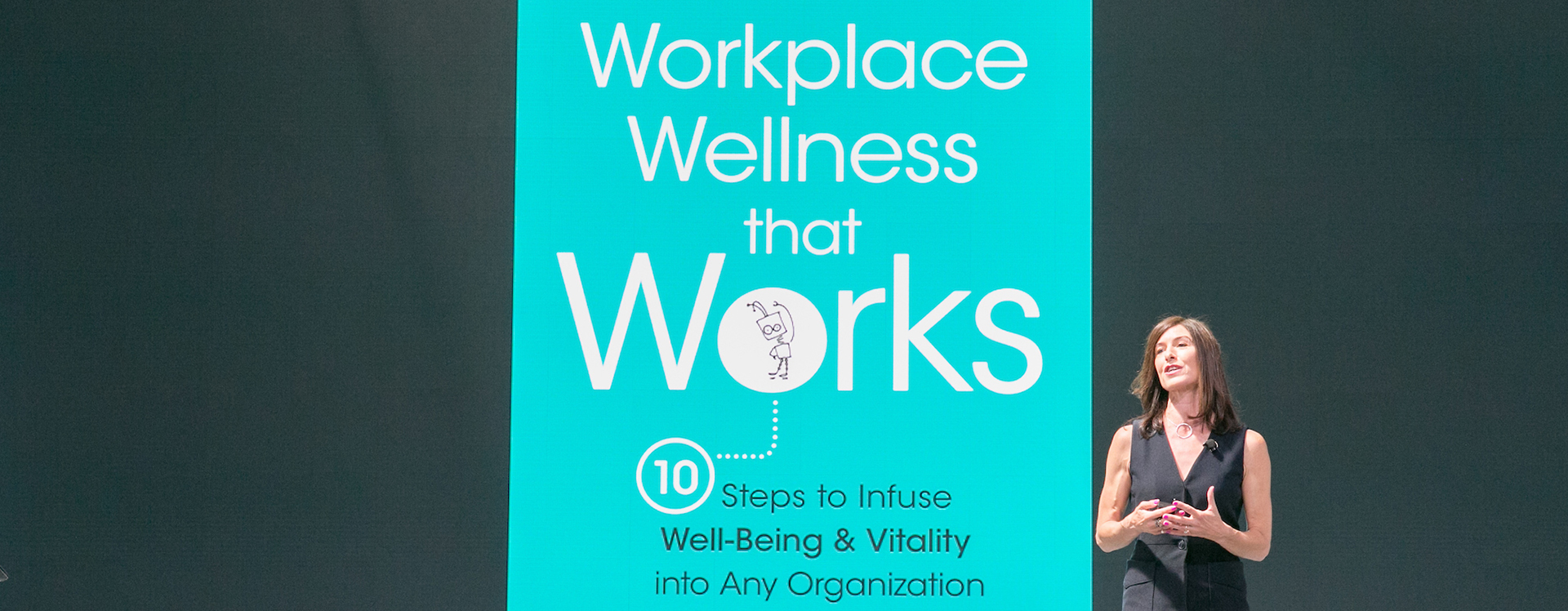There’s no question that the COVID-19 pandemic has affected nearly every facet of life. With health and well-being now in an elevated global spotlight, health and wellness professionals and initiatives are crucial, but still not always prioritized within organizations. The future feels uncertain for many, but it is also a time of possibility and open for change.
Laura Putnam has dedicated her career to the betterment of wellness. Along with being an author, speaker, trainer, and consultant for various Fortune 500 companies, nonprofits, and academic institutions, Laura Putnam is the CEO and founder of Motion Infusion, a wellness and human performance improvement provider. Her book, Workplace Wellness that Works is a required textbook in the first course of the 100% online UW Master of Science in Health and Wellness Management (HWM) program.
The UW HWM team connected with Laura Putnam recently to talk about the future of the health and wellness field and what students and professionals can do now during this time of ever-evolving uncertainty.

What are your thoughts and observations about the immediate impact of the COVID-19 pandemic on employee wellness initiatives?
Laura Putnam (LP): Companies, wellness providers, and wellness consultants are needing to reinvent themselves because a lot of them—including myself—have provided primarily face-to-face offerings. Obviously, we need to provide a lot more virtual options.
Second, this global situation definitely has made a case for the importance of investing in our health and well-being and for companies to be investing in wellness programs.
And then the third piece—which I’m particularly intrigued about—is that if there’s anything that we’ve learned from COVID-19, it is that there is no me without you. That is, the only way forward is together. I think that this is a very important lesson for all of us.
Historically, healthcare, and by extension, wellness, has been largely viewed as a personal matter. So, what I have heard over and over again is the overstated mantra: “Take personal responsibility for your health.” Ugh, give me a break. The truth is that any individual pursuing better health will likely face a whole host of cultural and environmental barriers that make the healthy choice the difficult one. Now with COVID-19, we are able to see very clearly the need to take a community-based approach toward health and wellness. We need to collectively address the social and cultural factors that either push us toward making a healthier choice or push us away from it. I hope that this lesson will help to reshape how we approach wellness moving forward.
In your role, how are you helping clients maintain physical and emotional well-being while most people are working remote?
LP: That’s a great question. Before COVID-19 hit, these were already a challenge. Now, even more so!
I consider physical well-being—move, eat, sleep—to be the basics. During this time of sheltering in place, I talk a lot about the importance of “covering the basics.” Since we’re all feeling overwhelmed by the state of the world, I remind people that a little can go a long way. For example, while physical activity is important, exercise might feel like too much right now. So, I remind people that every movement counts, whether it’s getting up to clean the house or playing with your kids or taking a spin around the block.
In terms of emotional well-being, now’s a really good time to go outside of the typical wellness box. How about tapping into the good work of philosophers like Viktor Frankl, author of Man’s Search for Meaning? His work is a good reminder to focus less on the circumstances, and more on how we respond to the circumstances. Here’s where you can bring physical well-being back into the conversation. Remind people that one of the best ways to respond is to cover the basics.
Beyond that, though, help people to tap into universal psychological needs like connection, feeling a sense of mastery, knowing one’s purpose, and finding meaning. When it comes to the latter, I have found that literature can help. We might say that literature picks up where science leaves off. A few of my favorites, and especially good ones for now, are Love in the Time of Cholera, by Gabriel Garcia Marquez, and Bel Canto, by Ann Pachett.
Finally, remind people that they are not alone. We’re all having to make big changes overnight. Working parents are having to juggle between being professionals and being teachers. Couples are having to navigate working and living together 24/7. Many single people are feeling especially isolated. It’s OK to call these out. You don’t have to have the answers. Just provide a forum (albeit virtual) for people to talk about it.
Historically, employee wellness initiatives are one of the first things eliminated when budgetary cuts are needed. What are you hearing from clients about support for employee wellness given the economic downturn?
LP: As of now, I’m hearing a lot about how important wellness really is! If anything, several client organizations are investing more toward it. However, that may be short term.
As the pandemic continues and the economy struggles, I think wellness will likely become a budgetary challenge. If that does become the case—or if you’re finding this already—look for other avenues. In particular, I have found learning and development to be a good one. Safety is another one, or even diversity and inclusion. Going through these different avenues will require some repositioning of what you offer. So, for example, I market our “Managers on the Move” workshop as a “leadership-meets-wellness” program, designed for leaders and managers. As a result, I’ve been able to successfully get this workshop integrated into a number of company leadership development tracks.
If the budget is still tight, what would you recommend refocusing on within health and wellness initiatives? Are there areas that need to be prioritized right now?
LP: There are three main areas that are important right now given the world’s circumstances: social well-being, emotional well-being, and financial well-being. If you’re not already focusing on these areas, it is especially important to do so now.

All three of these areas tie to social determinants of health, or the non-health factors—such as income, neighborhood safety, and access to good schools—that impact health outcomes. Every wellness program professional needs to be thinking about how their messaging and programming acknowledge and address these deeper issues.
The pandemic has hit a fragile society—one that has not invested in correcting societal imbalances, and one that has failed to invest in public health. Consider, for example, that while we as a nation spend about 2.5 times more per capita on healthcare than any other country, less than 3 percent of all that money goes toward public health! This statistic is just shocking to me. It is no wonder that the U.S. has been so hard hit by COVID-19. So, how does all of this relate to your work as a wellness professional? You need to be aware of how the pandemic has affected some groups of people disproportionately, and know there is no one-size-fits-all approach.
Within this big picture, however, I think this is a good opportunity for managers to step up and pay more attention to their team members. As a wellness leader, encourage the managers you work with to reach out to their team members not only for work-related issues, but also just for human connection. Encourage managers to show a little more vulnerability around the struggles they’re facing, as this will give permission to their team members to do the same.
Where do you see the direction of workplace well-being moving toward in the next five years?
LP: I hope that what we are going through today will serve as an opportunity for public health (and wellness) to get the recognition that they deserve. I think there will be a growing emphasis on social determinants of health, and likely a growing cross-pollination between community outreach and wellness.
On an organizational level, I think that there’s going to be a greater focus on culture, and I mean “culture” in a deeper sense. That is, “culture of health” is not just about providing healthy options in the break room or having the CEO make a token statement about the importance of health. Rather, this will require taking a deeper look at the underlying ethos of the company culture. Is it one that supports or undermines well-being at work? Are employees actually healthier because of where they work, or less so? A growing body of evidence suggests that it is the workplace itself that is driving skyrocketing rates of employee burnout.
Along with that, I think there will be a growing emphasis on activating managers as key influencers in shaping well-being at work.

Get Program Guide
Learn more about our 100% online degree and certificate programs.
Get Program Guide
Learn more about our 100% online degree and certificate programs.
Aside from completing a health and wellness degree, what are other experiences you’d recommend a student to pursue given the current COVID-19 restrictions—especially for those who are early in their career?
LP: It’s never too early to start building your platform and presence on social media, especially if you are planning on becoming an entrepreneur.
Also, it’s good to think about the direction that you might want to take within the field. Do you want to work internally for an organization, or do you want to be an independent wellness consultant? If it’s the former, I’d recommend that you start researching companies that have dedicated staff for wellness.
Start thinking about what you want your voice to be in the health and wellness space. Don’t be afraid to take a stand or to have an opinion. For me, I have observed a field that has taken too much of an individualistic approach toward wellness. So, my stand is that we need to take more of a culture-first approach. I make the argument that we are more “creatures of culture” than we are “creatures of habit.” That is, if we really want to see broad change, we’d be wise (as a field) to focus less on the individual and more on the concentric circles of cultural influence that surround the individual: communities, workplaces, schools, teams, etc.
You can start developing your own philosophy by listening and learning from other people. Start looking for TED Talks, books, and speakers that you connect with. Are there any people that you’d like to emulate? Just keep learning and collecting ideas, and know that this will likely be a life-long process!
What advice can you offer to UW HWM students pursuing their career goals?
LP: I think a lot of incoming wellness professionals feel like they need to have all of the answers. But what you need to think about instead is how to create powerful learning experiences. How can you engage people with content that is informative, thought provoking and emotionally charged? In my experience, when you tap into these three aspects, you spark the most change, as opposed to another session or webinar that simply doles out overstated tips.
Overcoming our current circumstances is going to take ingenuity and reinvention. Take heart in knowing that the work you do (or are about to) is essential. But, the challenge can seem daunting. I often think back to one of my early mentors, Ted Sizer, a leader of educational reform. Over and over again, he reminded us that becoming a good educator is really about asking good questions. So, start there. Ask yourself questions of where you see yourself in the health and wellness space and ask bigger questions focused on the greater community.
Want to learn more about how expert health and wellness professionals, like Laura Putnam, contribute to the courses within the UW Health and Wellness Management online program? Check out the program’s curriculum or contact an enrollment adviser at 608-262-2011 or learn@uwex.wisconsin.edu.










